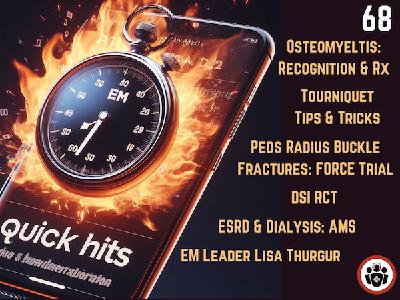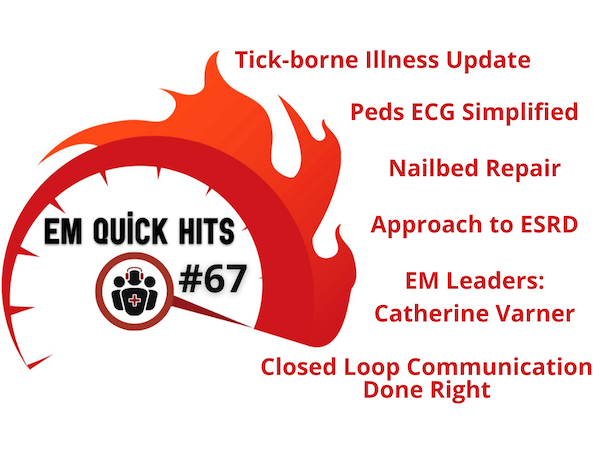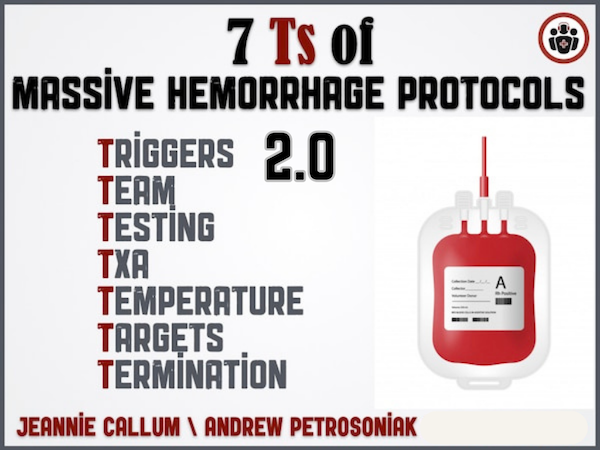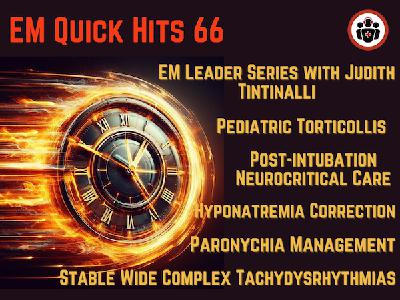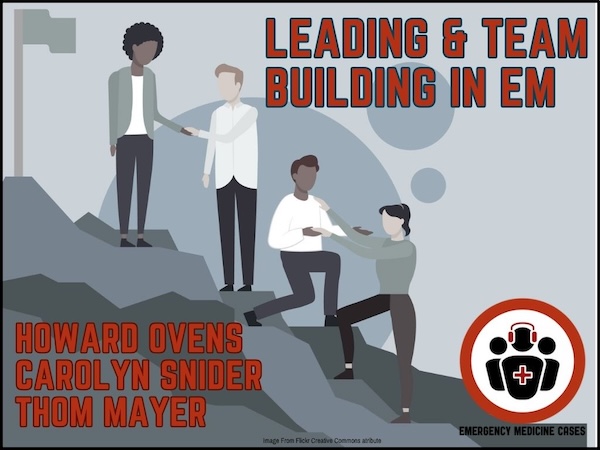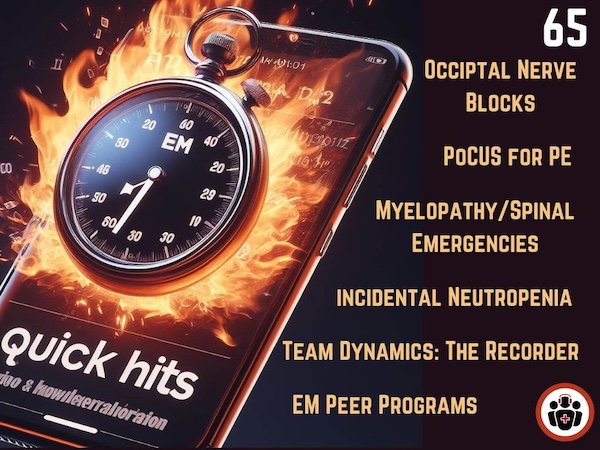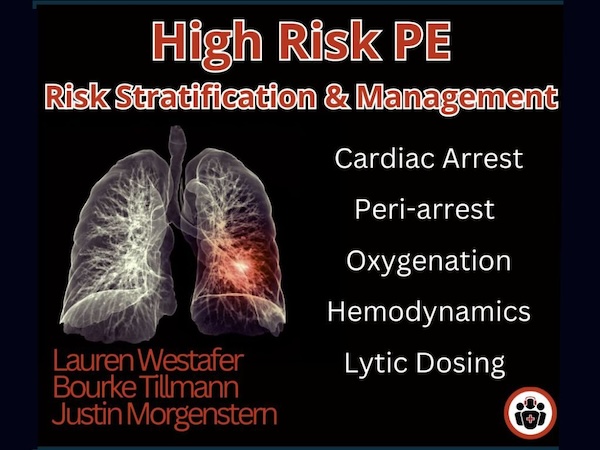EM Quick Hits 68 Osteomyelitis, Tourniquet Technique, Pediatric Distal Radius Buckle Fractures, DSI RCT, AMS in ESRD & Dialysis, EM Leadership Spotlight #3
Update: 2025-10-07
Description
Topics in this EM Quick Hits podcast
Isaac Bogoch on osteomyelitis recognition, workup and management in the ED (01:31 )
Anand Swaminathan on tourniquet application tips and tricks (41:29 )
Andrew Tagg on managing pediatric distal radius buckle fractures & the FORCE trial (44:36 )
Justin Morgenstern on Delayed Sequence Intubation (DSI): RCT Takeaways (50:43 )
Brit Long on ESRD & Dialysis in the ED: altered mental status differential diagnosis considerations (57:36 )
Lisa Thurgur & Victoria Myers on leadership and medical education in our EM Leadership Spotlight series (1:07:04 )
Podcast production, editing and sound design by Anton Helman
Podcast content, written summary & blog post by Brandon Ng, edited by Anton Helman, October, 2025
Cite this podcast as: Helman, A. Swaminathan, A. Tagg, A. Morgenstern, J. Long, B. Thurgur, L. Myers, V. EM Quick Hits 68 - Osteomyelitis, Tourniquet Technique, Pediatric Distal Radius Buckle Fractures, DSI RCT, AMS in ESRD & Dialysis. Emergency Medicine Cases. October, 2025. https://emergencymedicinecases.com/em-quick-hits-october-2025/. Accessed October 29, 2025.
Osteomyelitis: Recognition and ED Management
Untreated osteomyelitis can progress to disfigurement, impaired mobility, risk of systemic infection, and in some cases, amputation.
Clinical clues:
* Consider pathophysiology & risk factors:
* Direct inoculation – chronic ulcer present for >several weeks, ulceration overtop of bony prominence, and exposed bone acts as direct path for bacteria.
* Hematogenous spread – e.g. in IVDU.
* Wound infection not responsive to oral antibiotics course.
* Persistent pain is not sensitive nor specific to osteomyelitis (e.g. significant neuropathy in diabetes).
Physical exam:
* Inspect for ulcerations, and whether it is deep or with exposed bone.
* Probe‑to‑bone: helpful only if confident that you are probing bone (significant inter-observer differences).
* Positive test increases the likelihood of osteomyelitis.
* Difficult to distinguish between osteomyelitis (cortex infection) vs periostitis.
Labs:
* Consider ESR & CRP: ESR >70 has a high LR (≈11) for osteomyelitis. Some use ESR/CRP to monitor response.
* However, imaging modalities usually required to confirm diagnosis.
* Blood cultures: rarely positive in osteomyelitis (~10–30%), but reasonable to obtain in case of bacteremia and for guiding therapy.
* Wound swabs of limited value due to high rates of contamination but may guide management.
Imaging:
* X‑ray: sensitivity ~30–60%, specificity ~90%; X-ray early in clinical course more likely to be normal.
* CT: sensitivity ~65–85%, specificity ~90%; can direct therapy if positive with appropriate clinical context.
* MRI: gold standard for osteomyelitis.
Bugs & drugs:
* Most common: S. aureus (incl. MRSA) and streptococci.
* Pseudomonas uncommon in North America, not typically covered empirically unless presenting with classic "nail through shoe puncture" or culture/swab positive.
* Reasonable oral options for osteomyelitis (consult local biogram):
* Doxycycline or TMP‑SMX for gram positive and MRSA coverage.
* Consider fluoroquinolone (e.g., moxifloxacin) – generally well tolerated,
Isaac Bogoch on osteomyelitis recognition, workup and management in the ED (01:31 )
Anand Swaminathan on tourniquet application tips and tricks (41:29 )
Andrew Tagg on managing pediatric distal radius buckle fractures & the FORCE trial (44:36 )
Justin Morgenstern on Delayed Sequence Intubation (DSI): RCT Takeaways (50:43 )
Brit Long on ESRD & Dialysis in the ED: altered mental status differential diagnosis considerations (57:36 )
Lisa Thurgur & Victoria Myers on leadership and medical education in our EM Leadership Spotlight series (1:07:04 )
Podcast production, editing and sound design by Anton Helman
Podcast content, written summary & blog post by Brandon Ng, edited by Anton Helman, October, 2025
Cite this podcast as: Helman, A. Swaminathan, A. Tagg, A. Morgenstern, J. Long, B. Thurgur, L. Myers, V. EM Quick Hits 68 - Osteomyelitis, Tourniquet Technique, Pediatric Distal Radius Buckle Fractures, DSI RCT, AMS in ESRD & Dialysis. Emergency Medicine Cases. October, 2025. https://emergencymedicinecases.com/em-quick-hits-october-2025/. Accessed October 29, 2025.
Osteomyelitis: Recognition and ED Management
Untreated osteomyelitis can progress to disfigurement, impaired mobility, risk of systemic infection, and in some cases, amputation.
Clinical clues:
* Consider pathophysiology & risk factors:
* Direct inoculation – chronic ulcer present for >several weeks, ulceration overtop of bony prominence, and exposed bone acts as direct path for bacteria.
* Hematogenous spread – e.g. in IVDU.
* Wound infection not responsive to oral antibiotics course.
* Persistent pain is not sensitive nor specific to osteomyelitis (e.g. significant neuropathy in diabetes).
Physical exam:
* Inspect for ulcerations, and whether it is deep or with exposed bone.
* Probe‑to‑bone: helpful only if confident that you are probing bone (significant inter-observer differences).
* Positive test increases the likelihood of osteomyelitis.
* Difficult to distinguish between osteomyelitis (cortex infection) vs periostitis.
Labs:
* Consider ESR & CRP: ESR >70 has a high LR (≈11) for osteomyelitis. Some use ESR/CRP to monitor response.
* However, imaging modalities usually required to confirm diagnosis.
* Blood cultures: rarely positive in osteomyelitis (~10–30%), but reasonable to obtain in case of bacteremia and for guiding therapy.
* Wound swabs of limited value due to high rates of contamination but may guide management.
Imaging:
* X‑ray: sensitivity ~30–60%, specificity ~90%; X-ray early in clinical course more likely to be normal.
* CT: sensitivity ~65–85%, specificity ~90%; can direct therapy if positive with appropriate clinical context.
* MRI: gold standard for osteomyelitis.
Bugs & drugs:
* Most common: S. aureus (incl. MRSA) and streptococci.
* Pseudomonas uncommon in North America, not typically covered empirically unless presenting with classic "nail through shoe puncture" or culture/swab positive.
* Reasonable oral options for osteomyelitis (consult local biogram):
* Doxycycline or TMP‑SMX for gram positive and MRSA coverage.
* Consider fluoroquinolone (e.g., moxifloxacin) – generally well tolerated,
Comments
In Channel

